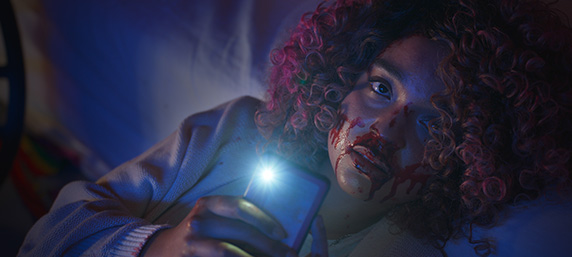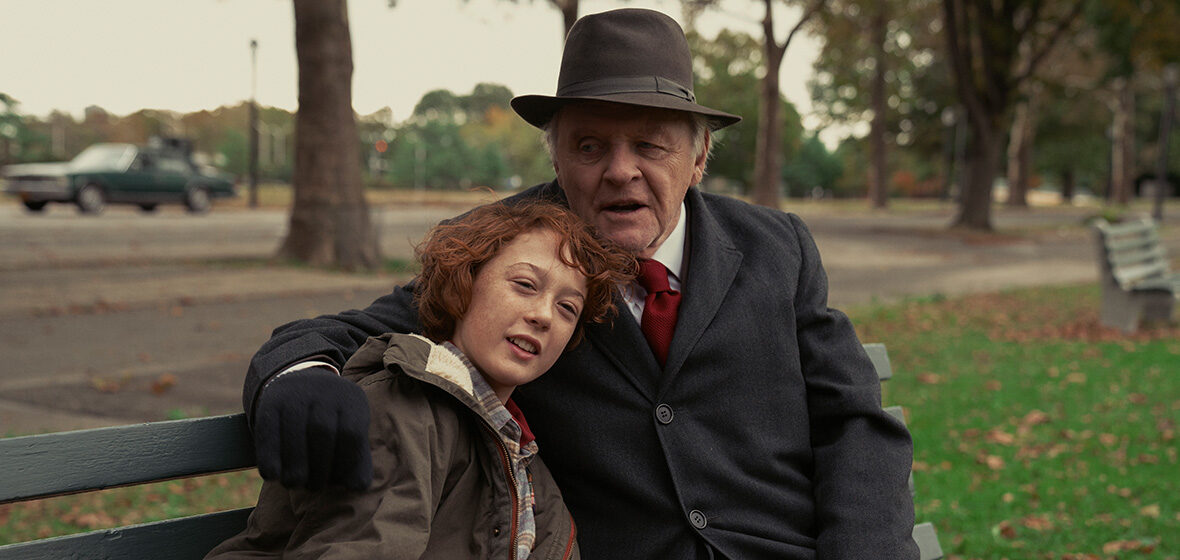Armageddon Time
4 out of 5
Armageddon Time rekindled in me embarrassing childhood memories I thought I had lost. Watching young Paul Graff (Banks Repeta) navigate the rapid and unpredictable waters of early teenagehood was cathartic. It reminded me of those small but significant moments we have growing up, like the time we discover we can make a class laugh, or realise we’ll have to face life after disappointing the one family member we respect, or feel shock as we realise from now on we’ll need to question whether we really do deserve our privilege.
Armageddon Time feels real, probably more so than other classic coming-of-age stories, especially Truffaut’s classic The 400 blows, to which this film has bafflingly been compared. Paul doesn’t try to be an adult like Antoine Doinel did; he doesn’t read Balzac; he’s just discovered Sugar Hill Gang; and he doesn’t want independence, because he’s still trying to understand the world unravelling in front of him.
Set in the 80s in New York, Armageddon Time signals the return of filmmaker James Gray to sharing his memories after his foray into contemplative sci-fi (Ad Astra) and historical adventure (The Lost City of Z). Those films were excellent in their own way, but this is Gray’s natural habitat. As Grey himself is the grandson of Jewish-Russian immigrants in New York, his most accomplished films have dealt closely with the New Yorker experience of applying one’s cultural identity to the Big Apple’s melting pot. This film feels like it hits too close to home, though.
Paul is a precocious young kid who likes to daydream and draw in class. He’s close to his grandfather (Anthony Hopkins), who sees Paul’s potential for being a good person. He takes every chance he gets to teach the values of compassion and defending the little man through the perspective of his family’s story: refugees who fled the war in Europe only to encounter poverty, bullying and antisemitism in America. Paul’s mother, Esther (Anne Hathaway), is the president of the school’s PTA, while the father, Irving (Jeremy Strong), works to provide his children with better opportunities than he had himself.
It’s in this condition that Paul befriends Johnny, an African-American classmate who shows Paul how privileged his life is. Right at the start, there’s a moment where Johnny is wrongfully accused of doing something that Paul did — just because of his race. The camera lingers on Paul’s confused face as he reels with the notion that prejudice directed at someone else is protecting him.
Gray shows America not as an idealised place of opportunity but as one that gives an unfair advantage to some. He’s not trying to show the need to change society as we know it, but to present its most damning elements to Paul, to teach him how to be a good person. Every scene includes something familiar to many of us: a child experiencing consciously for the first time what it is to be someone taking advantage of a system skewed towards himself. In the latter part of the film, the Graffs move Paul to a private school where the country’s future leaders are educated. Fred Trump (John Diehl) and Maryanne Trump (Jessica Chastain) are invited to give a jingoistic speech about the exceptionality of the school’s students, in contrast with Johnny’s misfortune as he descends into further misery.
The filmmaker’s devotion to authenticity finds its way into the actors’ performances. Repeta does an excellent job of fleshing out a character whose only role is to learn the world that the world isn’t fair to everyone — just to the chosen few. Hopkins is, unsurprisingly, tremendous in the type of measured performance he has been mastering since Remains of the Day, but it’s Hathaway and Strong who surprised me the most. It’s a revelation to see two actors with larger-than-life styles toning down their usual performance style to mere nuances of voice and mannerism. In a short scene near the end, Strong’s character turns from a stern and authoritarian father into one who is gentle and understanding, and this is depicted both appropriately and truthfully. The scene perfectly rounds the character, granting him great emotional depth.
Privilege is the fuel on which America runs, the film seems to say. The Graffs sit around the television set to see the results that gave Ronald Reagan the presidency. An air of pessimism lingers, and is heightened by the presence of the Trumps: a reminder of how much worse things are about to become. Politically there is nothing new here, but I doubt it’s Gray’s intention to teach. Instead, he takes the chance to reframe nostalgia – the 80s are still remembered today as a time of happiness and abundance, and Reagan’s shiny city on a hill was perhaps the beginning of the end we are now living. In the melancholic last shot of the film, Paul seems to be the only person to realise this.

Sissy
3 out of 5
The ramifications of privilege are not dealt with in Sissy. This Australian stylised horror-thriller takes Gen Z to task by highlighting how their self-centred nature contrasts with their constant demand to be validated. It reminds me of another Gen Z horror film that came out this year – the surprisingly acerbic Bodies Bodies Bodies. Still, where that film was witty and self-aware, Sissy is made with the sanctimoniousness of a cynical millennial shaking their fist to complain about “kids these days”.
The film follows Cecilia (Aisha Dee), a social media influencer who gathers thousands of followers with her new-age content about believing in oneself and finding one’s self-worth. At home, Cecilia finds comfort in all the likes and positive comments her posts receive, but out in the real world she’s uncomfortable almost to the level of agoraphobia.
After a random encounter with a childhood best friend, Emma (Hannah Barlow, who also co-wrote and co-directed), Cecilia is invited for a long weekend at the house of another former acquaintance. Alex (Emily De Margheriti) used to bully Cecilia when they were kids.
The encounter rekindles Cecilia’s love for and obsession with Emma, but also her memories of the event that caused her own trauma. Unable to connect with Emma’s friends, Cecilia becomes increasingly isolated— until, accidentally, or perhaps not, people start dying. In gruesome ways.
Sissy is a film that I really wanted to like. The almost whimsical style fits with the world of social media fantasy Cecilia lives in, and Dee plays her so sincerely that she deserves more opportunities to become a bonafide scream queen. Each death was hilariously inventive, with a surprising amount of gore that pleased the little film nerd in me.
In this film there is blatant criticism of our society, of our obsession with social media and unhealthy egocentrism. The characters, who collectively bear all of the varying degrees of sexual identity (is this supposed to be a critique of society, like other elements in the film?), watch only one show: an inane reality show spoofing the likes of Love Island. But, beyond “isn’t modernity so frivolous”, the filmmaker has nothing more to say about the subject.
In terms of satire, I think the filmmakers have taken the easy way out, skimming the surface of satire rather than exploiting it to its full potential. Bodies Bodies Bodies portrayed the whims and quirks of upper media-class Gen Z with refreshing candour. Sissy steers much too far towards satire, so much so that it becomes a parody.
To keep the drama going, Barlow and her writing partner and co-director Kane Senes frame each scene around a flashback to the traumatic event that changed both Sissy’s and Alex’s lives. They don’t provide all the necessary information, afraid the audience will draw its conclusions too early. Instead, the scene is repeated several times, each time with a new element that differentiates it from the last.
This method of scene building is precisely what is wrong with Sissy. First, for something like this to work, each unique element introduced in a new scene would have to change our perception of the flashback. Instead, we have an inkling of what happened right from the very first scene, and everything revealed in subsequent scenes then plays out precisely as we expected. Secondly, and more egregiously, the scene is utterly devoid of relevant social commentary, and this is surprising considering the cynical perspective that prevails in the remainder of the film. That moment could have come from the implicit commentary about racism (Cecilia is biracial) or about the classist system (Alex is wealthy). Still, the defining moment that sets the focus for this social satire is the scene that highlights how children bully other children for no reason, and how this can trigger severe mental health issues.
I’m left with the impression that the filmmakers were so caught up with patronising Gen Z that they ignored what has happened with the Millennials. Privilege is the concept at the centre of the film’s woes, and no one, not even its protagonist, seems to be aware of it. If anything, it reduces an excellent visual idea, with terrific horror elements, to a pretty tepid joke. And good horror craves more than this.




